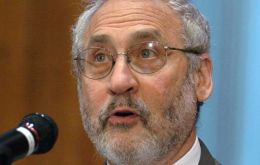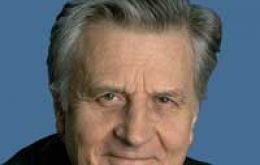MercoPress. South Atlantic News Agency
Economy
-
Wednesday, May 13th 2009 - 15:50 UTC
China’s exports down 22.6% in April, sixth month running

China's exports in April were down 22.6% from a year ago, the sixth successive month of decline. April's fall in exports was also bigger than the 17.1% annual decline recorded in March
-
Wednesday, May 13th 2009 - 15:46 UTC
Brazil’s finance guru anticipates 4% GDP expansion in 2010

Brazil’s GDP should expand 4% in 2010 but the performance of the economy in the first quarters of 2009 will be dismal, in the range of zero growth or even below, said economist Delfim Netto.
-
Wednesday, May 13th 2009 - 02:01 UTC
UK adult minimum wage £ 5.80 an hour from next October

The United Kingdom announced that the national minimum wage is to increase by 7p to £5.80 an hour. The new adult rate for workers aged 22 and over will come into effect in October.
-
Tuesday, May 12th 2009 - 10:39 UTC
Nobel laureates warn about risks of a “lost decade”

Nobel Economics laureate Edgard Prescott and Joseph Stiglitz warned Monday of a “lost decade” and a worsening of the global financial crisis in the short term during a forum in Sao Paulo, Brazil. The “lost decade” reference is to the stagnation of the economy as happened with Japan during the nineties.
-
Tuesday, May 12th 2009 - 10:03 UTC
Global economy close to “inflection point” says leading central bankers

The global economy has stopped its steep slide and is on the verge of making the long, slow climb back toward stability, said European Central Bank President Jean Claude Trichet who chaired on Monday a meeting of the world's leading central bankers.
-
Tuesday, May 12th 2009 - 05:24 UTC
Russia Second Largest Arms Exporter; South America Promising Market

Stockholm International Peace Research Institute, SIPRI latest data on global arms transfers published this week reveal that Russia remains the second largest arms exporter in the world, accounting for a quarter of global exports of major conventional arms.
-
Tuesday, May 12th 2009 - 04:46 UTC
General Motors admit bankruptcy “more likely” on June deadline

US auto maker General Motors' top executive said Monday that it's more likely the company will file for US bankruptcy than meet a June 1 government deadline to restructure.
-
Monday, May 11th 2009 - 10:31 UTC
British banks CEOs dampen expectations of a swift recovery

Bad debts at part-nationalised UK Royal Bank of Scotland could soar to almost £12 billion this year, the bank has said. RBS, which is 70.3% owned by the British taxpayer, posted loans losses of £2.9 billion for the first quarter of 2009, but directors said full-year bad debts could be “at least” four times as high.
-
Monday, May 11th 2009 - 10:25 UTC
New mine increases Chile’s state-owned copper company reserves by 20%

Chilean state-owned mining company CODELCO announced last week its discovery of a new mine site near its existing División Andina site (Region V), some 80 kilometres north of Santiago.
-
Monday, May 11th 2009 - 08:07 UTC
Peru private sector confident the crisis “has reached the bottom”

Peru’s main private business confederation believes the current economic crisis “has reached the bottom” in the country and forecasts the economy will experience an annual expansion of 3.5%.
